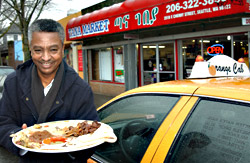I have spent a lifetime asking cabbies for restaurant tips. They have taken me to classic “Meat ‘n’ Three” places outside of Nashville and incredible mustard-based barbecue dives in strip malls in Charleston, and they helped me find incredible ceviche in my own hometown of New York City.
As a relative newcomer to Seattle, I always wondered what culinary surprises lurked behind restaurant doors here with rows of taxis outside. So I took a little time to find out, chatting with drivers on the day and night shifts, and hopping a ride to some of their favorite joints.
There are approximately 1,200 cab drivers in King County, according to Terry Davis, acting director of the county’s Cab Drivers’ Alliance. Almost all of them are male, with the exception of about five women, and they hail from 10 to 12 different countries, he estimates. “Most of the cab drivers are not really overweight,” notes Davis. The reason becomes clear when you hear about the great ethnic eats they are digging into.
“I eat mostly at the Addis Cafe,” says Worku Melese, as he sits in the cab line outside Seattle’s posh Fairmont Olympic Hotel. Kitfo (steak tartare, prepared with butter) and tibs (a dish of spicy beef or lamb cooked with onions and peppers) are his favorites. The Addis, in the Central District, has a bar in front and traditional Ethiopian dyed reed tables upstairs for dining. The meat and vegetable combo plate ($13.99) is enough for two, and the light Harar beer ($4) pairs well with the spicy food. After dinner, you can even shoot a game of pool at the table in back.
The nearby Cafe Selam is a favorite of Fasika Moges, a driver who is also an accomplished painter (he shows his work at Columbia City Gallery). Moges goes to Selam for foul, a favorite cabbie breakfast dish. Spicy fava beans covered with scallions, tomatoes, onions, and hard-boiled eggs ($6), this luscious dish is often available all day. Selam’s beef kitfo ($8) is spicy, and its beef tibs ($8) are succulent. They can be sampled with a glass of traditional tej (honey wine) for $3.50 or a Bedele Light beer for $3.25. Owner Abebu Wondem says she gets about 20 cab drivers a day, who come mostly for the tibs and her famous foul.
Down the STREET is the Tana Market, a combination store and restaurant where Wessen Darge, an Ethiopian native who has lived in Seattle for 15 years, says they make the best beef tibs ($8) in town. They also stock bags of the sour flatbread injera, and loads of traditional spices like bessobila (Ethiopian basil); they even sell corn dogs and burritos. Darge also likes Meskel Ethiopian Restaurant down the street for its kitfo, which he calls “hot and yummy.” Between meals, he goes to Starbucks for snacks. “I spend $1,200 a year there, and they have never given me a cup of free coffee.” When not at Starbucks or the Tana, he notes he is also available “to go the Met or Anthony’s if someone invites me.”
Darge also makes his own bread to share with other drivers. He says it’s a healthy alternative to the butter- and egg-based breads he finds all over town. The flavor, he notes, is somewhere between cake and bread: It’s “a bread that our moms make.” You will have to catch up with him in the taxi rank outside the Westin if you want to try it.
Daniel Tschnev, one of a few Bulgarian drivers in town, often eats at Firefly in Queen Anne, which despite being an Italian restaurant is one of Seattle’s few places that serves traditional Bulgarian dishes. Cured meats like suguk are served along with a savory and filling pork casserole called kaverma, made with red wine and onions.
Most of the cabbies I spoke to enjoyed a wide range of foods. “You get bored because it’s gray and rainy, so you have to try different things,” explains Moges. Also, many of them have been exposed to a wide range of cuisines through co-workers and their own travels. Darge, for one, has lived in New York, Dallas, Cairo, Stockholm, and Helsinki.
Some cabbies reach for new foods during work hours, preferring to eat their traditional foods at home. “I used to be a professional cook, so I don’t want to go to Indian restaurants,” says Jai Deep. He says he prefers the chicken chalupa at Taco Bell and restaurants like the Crab Pot. Avtar Dhaliwal, another Indian driver, loves teriyaki and Chinese, as well as Japanese food. The one Indian restaurant he will deign to eat in is India Combo in Kent, where he goes for the chicken saag ($9.50), made with spinach.
“Indian food in Seattle is really lousy,” adds Jason, another Indian taxi driver, who declined to give his last name. His favorite snack stop? Burrito Loco in Ballard.
Addis Ethiopian Cafe, 1224 E. Jefferson St. 206-325-7805, CENTRAL DISTRICT. Burrito Loco, 9211 Holman Rd. N.W., 206-783-0719, BALLARD. Cafe Selam, 2715 E. Cherry St., 206-328-0404, CENTRAL DISTRICT. The Crab Pot, 1301 Alaskan Way, 206-624-1890, WATERFRONT. Firefly, 2128 Queen Anne Ave. N. 206-694-0055, QUEEN ANNE. India Combo, 24023 104th Ave. S.E., 253-520-2440, KENT. Meskel Ethiopian Restaurant, 2605 E. Cherry St. 206-860-1724, CENTRAL DISTRICT. Tana Market, 2518 E. Cherry St., 206-322-3835, CENTRAL DISTRICT.





